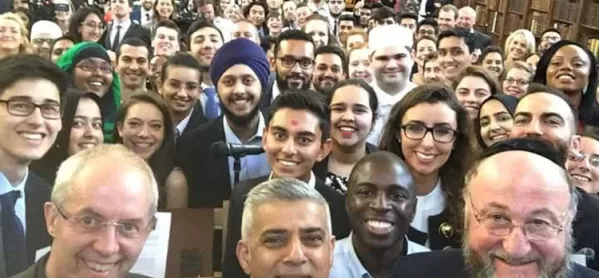There is a great deal to be optimistic about in London today.
Within London’s schools, streets and parks is a symphony of different languages, cuisines, faiths, fashions and cultures: London today is a place where it’s possible to fluidly move between identities, and experience a multitude of global communities in a single day.
It is an experience many of us know, and one that I can personally attest to. Growing up as a young person of faith, I have as many vivid memories of eating kosher salt beef sandwiches in Golders Green as I do of studying the architecture of London’s churches with my father, the late Naz Bokhari.
And it’s also not an experience that has come about by chance. Steadily, sometimes quietly, but always persistently, it is a landscape that has been shaped as much by the energy of its young people as it has by its civic and political leaders.
London’s experience of diversity is exceptional - and it deserves to be celebrated and invested in. However, at the same time many of our diverse communities, and in particular our youth, are feeling vulnerable. Since Brexit, teachers have reported an increase in bullying of young children with Eastern European heritage. A young member of my own family was told by a stranger to “Leave” the country the day after the vote.
That is why Lambeth Palace’s Interfaith Iftar, organised by the Archbishop of Canterbury, Justin Welby, in partnership with the Naz Legacy Foundation, the foundation set up in the name of my late father, could have not come at a more important time.
One hundred young Londoners of different faiths or no faith joined the Archbishop and Chief Rabbi, with the new mayor of London, in the breaking of the fast during the Islamic fasting month of Ramadan. At a time when the bond between London’s eclectic communities is constantly being tested, the iftar was an opportunity to affirm the unifying culture of the London that I grew up in.
The now infamous “selfie” taken by the mayor, Sadiq Khan, perfectly symbolised the spirit of the Lambeth Palace Iftar. With the Archbishop of Canterbury and Chief Rabbi either side of him, and the future of London behind them, a hundred young optimists laid claim to a more welcoming and diverse future. The selfie went viral within hours. Amongst those sharing it, JK Rowling tweeted that “this picture gives me hope”; and actor Ashton Kutcher reminded us that “we have so much more in common than we realise”.
But the event was more than the infamous selfie. The young people came together to discuss their ideas about how they wanted to bring communities together and then had an opportunity to present these ideas to the Archbishop, Chief Rabbi and the mayor of London. Many of them are now working together supporting existing community projects and using their new-found friendships to develop new ideas to benefit all Londoners.
‘We can learn a lot from our youth’
Our leaders and all of us have much to learn from our youth about the spirit of what London can and should be. London’s young people, who are enriched by the cultures of their elders or their neighbours, yet firmly rooted in the identity of their city, are uniquely positioned to bring and bind diverse communities together.
They are simultaneously able to rejoice and look past their differences; they are often willing to be more courageous to make a stand for progress. Throughout London, they are agitating for change, in their universities, colleges, and schools, as well as their churches, synagogues, temples and mosques.
Equally, elders and leaders throughout London have a responsibility to act as role models - particularly for those youth who are excluded from the opportunities our city and society have to offer. The new mayor of London - the son of a bus driver and raised on a council estate - credited in his speech the inspirational role that his secondary school headteacher, Naz Bokhari, played in his life. Naz Bokhari happened to be the first Muslim and Asian headteacher in the UK, living proof that one’s ethnic or religious heritage needn’t be a barrier to aspiration and success.
The Lambeth Palace Interfaith Iftar was thus a fitting tribute to the legacy of Naz Bokhari, who worked tirelessly to bring communities together and inspire and support the next generation of leaders.
For the Archbishop of Canterbury, the Chief Rabbi and the mayor of London to join hands with diverse young Londoners and stand united in celebration sends a strong message of hope to nation, country and world. And for the elders of our city to sit and break bread with its youth will set the tone for the sort of communities we want - diverse, and bonded and united by their energy and optimism.
Harris Bokhari is national board member of the Prince of Wales’ mentoring charity Mosaic, and founder of the Naz Legacy Foundation
Want to keep up with the latest education news and opinion? Follow TES on Twitter and like TES on Facebook




